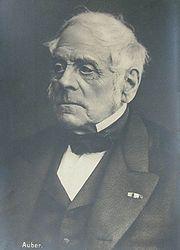- |
User Links
D. F. E. Auber

| Short Name: | D. F. E. Auber |
| Full Name: | Auber, D. F. E. (Daniel François Esprit), 1782-1871 |
| Birth Year: | 1782 |
| Death Year: | 1871 |
Daniel Francois Esprit Auber France 1782-1871, Born in Normandy, Auber's father was a printer, and expected his son to follow in that trade, but he also let Daniel learn how to play several musical instruments. His first teacher was a Tirolean composer, Josef Ladurner. Auber began composition, producing several concertos for violin, modeled after Lamare. They played at the Paris Conservatory by Masaz, and were given much praise. He did a resetting of an old comic opera, Julie, studying with the renowned Luigi Cherubini. His opera failed. His father also died. He turned again to music, producing another opera fairing no better. His third attempt , La Bergere Chatekaine, in three acts, was the first of a series of brilliant successes written with librettist Eugene Scribe, His Opera-comique had 525 performances. Two susequent operas were as successful. He was elected a member of the Institut de France. The following year he was named director of the court concerts. Two more operas were very successful.In 1842, under King Louis Philippe. He was named director of the conservatoire and a member of the Legion of Honor, eventually commander. Two more major successes followed. He was well-loved, witty, and personally generous.
John Perry
| Tunes by D. F. E. Auber (1) | As | Instances | Incipit |
|---|---|---|---|
| EPHESUS (Auber) | Auber (Composer) | 34 | 54333 33456 55432 |


 My Starred Hymns
My Starred Hymns


